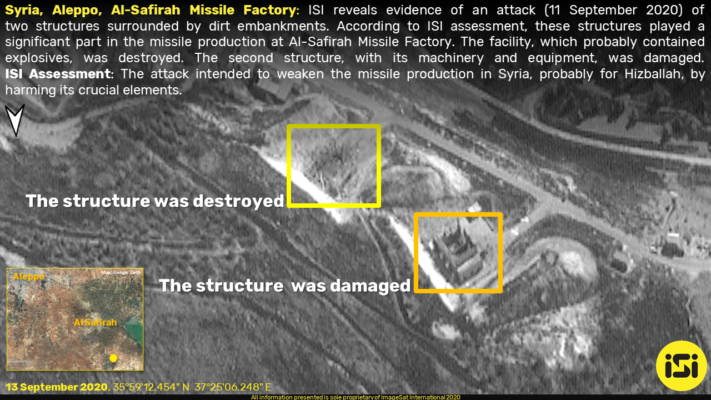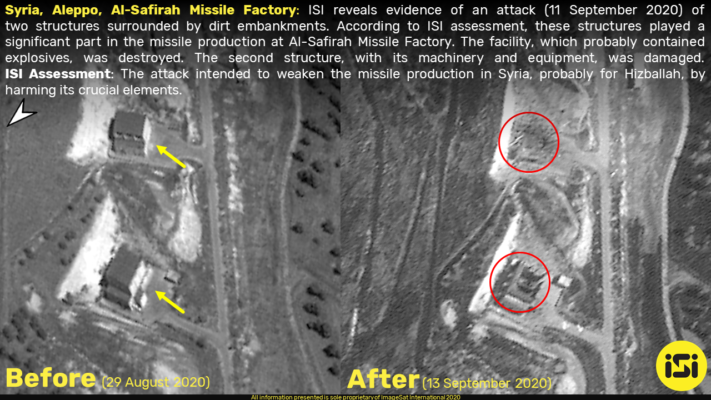
Tel Aviv. Syria with the help of Iran is trying to rebuild its chemical weapons stockpile. Israel is trying to foil that plan and on September 11, according to Syrian media, again attacked the facility where the chemical weapons are stored.
According to reports on Syrian social networks and Lebanese news sites, Israel on September 14 night attacked the largest chemical complex in the West Asia of the Syrian army, which is now under Iranian control.
According to estimates in Syria, Israel attacked a new arms shipment that arrived the day before by direct flight, by cargo planes, directly from Iran to the international airport of the city of Aleppo, only 23 km from the attacked military complex. Ba-Sefirah, which was destroyed September 14 night, and it is also known that there are warehouses in this complex that contain ballistic missiles. This complex was attacked, the last time by Israel at the beginning of May this year.
In an attack in May, Syrian sources claimed that the Israeli planes that attacked the military compound in al-Sefirah came from Iraq and entered Syria from the east.
In recent months, security officials in Israel have announced that Israel will increase its activities against Iran in Syria, as Tehran has expanded its presence with the help of armed militias loyal to it.
Israeli sources have claimed consistently that Syria has kept a large quantity of chemical weapons after the 2013 international agreement that allegedly forces the Assad regime to destroy all types of those weapons.

In recent months Iran has increased its efforts to try rebuilding the Syrian arsenal of chemical weapons.
It is not clear whether since September 2013 production of chemical weapons (CW) was entirely stopped throughout Syria. Additionally, reports by the Syrian opposition claiming hidden CW (mainly VX agent-loaded) in the area of Hama cannot be ignored. The opposition’s claim that at least 20 per cent of the Syrian CW arsenal was not declared might be true.
The employment of toxic chemicals by the Syrian regime continued during the first half of 2014. The chemical attacks mainly included chlorine, ammonia, and possibly additional toxic chemicals, such as pesticides. Regardless of the list of chemical warfare agents Syria declared, common and industrial chemical weapons have been and may still be used. The typical delivery mode has been dropping intoxicating barrel-bombs from helicopters. Airborne chlorine-releasing canisters have been used as well.
According to a report prepared by Dr Dany Shoham from the Begin-Sadat (BESA) center in Israel, although prohibited by the CW and BW (biological weapons) conventions, no toxic materials of biological origin, namely toxins, were declared by Syria. However, such agents are probably present in the Syrian arsenal. Besides, it is highly likely that Syria also continues to maintain certain pathogens as deployable biological warfare agents.
As per the experts, the security and safety within the remaining Syrian CW facilities are doubtful. Although often serving Assad as an excuse, there is a tangible danger that the rebels seized, or are prone to seize, undeclared depots of Syrian CW.
It is noteworthy that the Libyan army prevented the dispatch of mustard gas from Libya to the rebels in Syria. Unsurprisingly, various hurdles to enforcing the agreement were raised by Syria. Damascus proposed rendering the facilities inoperable. Yet that claim was rejected as easily reversible, and therefore as falling far short of the requirement under the Chemical Weapons Convention that all aspects of its program be destroyed.
Damascus has also denied free access to the inspectors to some of the relevant facilities. Furthermore, Syria was demanded to revise their provided list of CW and consequently submitted a “more specific” list. The original list had been based on estimates, not exact amounts of toxic agents found in storage and production facilities across Syria.
The revision of the list took place only after considerable discrepancies were pointed out between what the inspectors revealed, and what was on the original declaration. At any rate, it is doubtful that the revision is adequate. Assad is reluctant to give up the remaining declared CW production facilities, and probably additional undeclared chemical armament.
For now, the job done by the inspectors is notable, but is far from complete. Lessons should be learned from the sagas that took place during the chemical disarmament of Iraq and Libya. An undesirable zigzag chronicle that might now be emerging with regard to the total elimination of CW and related facilities in Syria ought not to be repeated.
Israeli intelligence has been following the rebuild efforts of the Syrian huge stockpile of chemical weapons and according to Israeli source the effort is to completely destroy it.
-The writer is an Israel based freelance journalist








